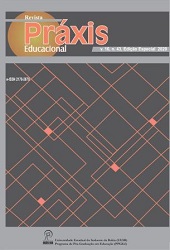ART EDUCATION AND COMPUTER: TRENDS AND CHALLENGES
DOI:
https://doi.org/10.22481/rpe.v16i43.7051Keywords:
Art-Education , Computer , School, Educational approaches-pedagogicAbstract
The article seeks to understand the challenges and trends regarding the sensitization and articulation of the computer for the teaching of Art. Our horizon is the following problematizations: What are the challenges and contemporary trends to the articulation between art-education-computer for the learning scenarios in Art? What are the discourses and concerns present in the dissertations and theses produced in the sphere of art-education and computer? What perceptions do teachers have about experiences with computer use in art classes? If technologies in the interfaces of artistic language, cultural production and everyday life never cease to provoke us, through social practices and interactions in the world, what questions emerge from this dialogical universe of knowledge? This is a hermeneutic research that proposes to trace the productions related to the field of art-education and computer,
problematizing the traditions and cultural instruments and their articulations in schools. After a bibliographic survey at the Brazilian Digital Library of Theses and Dissertations (BDTD), to understand the productions of the field, we conducted an exploratory study that took into account the conceptions of three teachers who work in schools and describe the horizon of art-education in computer use scenarios. We conclude that the use of the computer for artistic creation in the school routine can contribute to the didactic improvement of art-education byaccess to digital, but it is in the questionability of practical experience and in the educational effort of human reinvention that the knowledge of aesthetic narratives and cultural production gains new formative and social dimensions.
Downloads
Metrics
References
BAHIA, Ana Beatriz. Jogando arte na Web: educação em museus virtuais. 2008. 401f. Tese (Doutorado em Educação) - Universidade Federal de Santa Catarina, Florianópolis, 2008.
BARCELOS, Fátima Pinheiro de. O uso das tecnologias informatizadas no Ensino fundamental I: o uso do computador no ensino das artes visuais. 2002. 125f. Dissertação (Mestrado em Artes) - Universidade Federal de Minas Gerais, Belo Horizonte, 2002.
BEDIM, Acácia Aparecida Pinto. O ensino de conceitos geométricos no 2º ano do Ensino Fundamental usando a Webquest Viajando nas Obras de Arte. 2011. 174f. Dissertação (Mestrado em Educação) - Universidade Estadual Paulista, Presidente Prudente, 2011.
BULHÕES, Maria Amelia. Transterritórios: campo da arte e internet. Visualidades, Goiânia,
v. 8, p. 11-22, 2010.
CAMPELLO, Sheila Maria Conde Rocha. Arteduca: uma abordagem transdisciplinar para o ensino da arte em rede. 2013. 313f. Tese (Doutorado em Arte) - Universidade de Brasília, Brasília, 2013.
CASTRO, Rosana Andréa Costa de. Tecnologias de Informação e Comunicação: implicações da imagem digital para arte/educação contemporânea. 2008. 106f. Dissertação (Mestrado em Arte) - Universidade de Brasília, Brasília, 2008.
COSTA, Júlio Caetano. Vjedu – vídeo-jockey educativo: um software interativo para o visitante de uma exposição de arte. 2011. 126f. Tese (Doutorado em Informática na Educação) - Universidade Federal do Rio Grande do Sul, Porto Alegre, 2011.
FERREIRA JÚNIOR, Angelino Gomes. Os limites e possibilidades do emprego de multimídias no ensino de arte no Município de Abaetetuba/Pará. 2009. 118f. Dissertação (Mestrado em Educação, Arte e História da Cultura) - Universidade Presbiteriana Mackenzie, São Paulo, 2009.
FLUSSER, Vilém. O Universo das imagens técnicas. Elogio da superficialidade. Coimbra: Annablume, 2012.
GADAMER, Hans-Georg. Verdade e método. 7. ed. Petrópolis: Vozes, Bragança Paulista: EDUSF, 2005.
HARDAGH, Cláudia Coelho. Redes Sociais Virtuais: uma proposta de Escola Expandida. 2009. 157f. Tese (Doutorado em Educação) - Pontifícia Universidade Católica de São Paulo, São Paulo, 2009.
LOYOLA, Geraldo Freire. me adiciona.com. Ensino de Arte+Tecnologias Contemporâneas+Escola Pública. 2009. 148f. Dissertação (Mestrado em Artes) - Universidade Federal de Minas Gerais, Belo Horizonte, 2009.
ROSA, Maria Cristina da. A educação de professoras e professores de arte: construindo uma proposta de ensino multicultural a Distância. 2004. 187f. Tese (Doutorado em Engenharia de Produção) - Universidade Federal de Santa Catarina, Florianópolis, 2004.
SALLES, Beatriz. Rede social com música, arte e tecnologia. 2014. 171f. Tese (Doutorado em Arte) - Universidade de Brasília, Brasília, 2014.
SAMPAIO-RALHA, Jurema Luzia de Freitas. A utilização de linguagem vrml na Educação à distância em arte. 2003. 244f. Dissertação (Mestrado em Arte) - Universidade Estadual Paulista, São Paulo, 2003.
SANTOS, Cesar Augusto Baio. Da imersão à performatividade: vetores estéticos da obra- dispositivo. 2011. 219f. Tese (Doutorado em Comunicação e Semiótica) - Pontifícia Universidade Católica de São Paulo, São Paulo, 2011.
SANTOS, Moises Lucas dos. Arte-educação e tecnologia no ensino médio: reflexões a partir da proposta triangular. 2006. 162f. Dissertação (Mestrado em Artes) - Universidade de Brasília, Brasília, 2006.
SIQUEIRA, Paula Monteiro. Cinema digital e educação: novas formas de percepção Estética no século XXI. 2015. 143f. Dissertação (Mestrado em Educação) - Universidade Federal de São Carlos, São Carlos, 2015.
XAVIER, Cleber Cardoso. Escolas parque de Brasília: uso do laboratório de informática pelos professores de arte. 2013. 150f. Dissertação (Mestrado em Arte) - Universidade de Brasília, Brasília, 2013.
Downloads
Published
How to Cite
Issue
Section
License
Copyright (c) 2020 Práxis Educacional

This work is licensed under a Creative Commons Attribution-ShareAlike 4.0 International License.
You are free to:
Share - copy and redistribute the material in any medium or format; Adapt - remix, transform, and build from the material for any purpose, even commercially. This license is acceptable for Free Cultural Works. The licensor cannot revoke these freedoms as long as you follow the terms of the license.
Under the following terms:
Attribution - You must appropriately give credit, provide a link to the license, and indicate if any changes have been made. You may do so in any reasonable way, but not in a way that suggests that you or your use is endorsed by the licensor.
There are no additional restrictions - You cannot apply legal terms or technological measures that legally restrict others to make any use permitted by the license.










